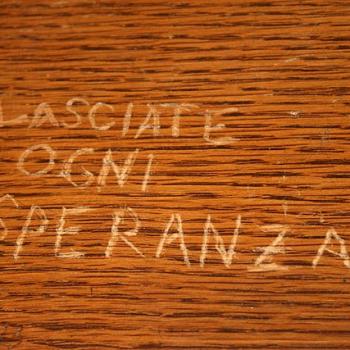Lectionary Reflections
Deuteronomy 26:1-11 (12-15)
February 14, 2016
First Sunday in Lent
It is the first Sunday in Lent and much of the talk is: what will we "give up for Lent?" I have, quite sardonically I admit, said each year that I plan to give up Brussels sprouts. The fact that I quite detest the taste of this pseudo-cabbage vegetable suggests the seriousness with which I take this talk of "giving something up." It frankly means nothing to me at all. I refuse to believe that Lent is finally about "giving something up." The fact that this first Sunday happens to fall on Valentine's Day, that glorious day of unlimited chocolate and scads of diamonds must make this giving up talk even more problematic. What chocolate lover is going to give up chocolate for Lent when Valentine's boxes laced with the stuff appear below many a lustful nose? Sorry. No giving up chocolate for me!
Deuteronomy 26 does not talk about giving anything up, thank God. It talks to the contrary about doing something quite active at the behest of YHWH. As part of one of the Moses sermons, purported by Deuteronomy to have been delivered by the great prophet to the chosen people standing on the verge of the promised land, it is stated that when the land has been possessed, one of the very first things all are to do is: "take some of the fruit of the ground which you harvest from the land that YHWH your God is giving you, place it in a basket and go to the place that YHWH your God will choose as a dwelling place for the divine name" (Dt. 26:2). So far this command sounds rather like a typical money Sunday in one of our churches. Are we not all bidden to share our harvest in the church at the call of our priest? "Commitment Sunday," we oftentimes name these crisp fall church days.
But what separates our calls for money to fund the programs and ministries of the church from what the Deuteronomist has in mind are two ideas. First, our responsibility, as we place our basket of first fruits at the feet of the priest, is to recite a well-known short creed about what we believe and know about the YHWH who has called us here. This creed announces in no uncertain terms that YHWH is the only God there is and is known by what the God has done for us from the beginning of our community's existence. This may sound like our recital of one traditional creed or another, but I think it is rather a different sort of act. "A wandering (or "perishing") Aramean was my ancestor; he went down into Egypt and lived there as an immigrant. (The traditional translation "alien" smacks too much in our day of ET; besides, the word used means a person who goes to live in a land not her own, either for a short or longer time or for the rest of her days, precisely the meaning of our word "immigrant.") They were few in number, but there they became a great nation, mighty and populous" (Dt. 26:5).
Our Christian creeds rarely sound like this, so specific, so rooted in events of the past. We speak in our recitations of generalized doctrines, not intimate connections with events that have made us who we are. These Israelites are a people formed by the actions of this YHWH, actions enshrined forever in the first commandment of the Ten (Dt. 5:6; Ex. 20:2). They recite this history, though they spend little time proving that the history actually happened. This is more sacred story than history, but that in no way reduces its present power. The recitation goes on to include the mighty acts of YHWH who in the face of the greatest power on earth, the power of pharaoh and Egypt, brought Israel up from the furnace of slavery "with a mighty hand and an outstretched arm, with a terrifying display of power, and with signs and wonders" (Dt. 26:8). And because YHWH has done all this, and because I am one of the beneficiaries of YHWH's acts, I bring my first fruits.
But there is a second difference between this small creedal statement and those we recite on Sunday. Once I have set my offering down before YHWH, my God, and have bowed down before YHWH, my God, then I am "to celebrate together with the Levites and the immigrants who reside among us" (Dt. 26:11). This is no simple recitation that ends after the words stop. I now am commanded to celebrate the gifts I have received and given with two groups that are not likely able to offer gifts as I can. There are first the Levites, landless priests, who do the holy work of priest but live only on the gifts of those whom they serve. The second group is the immigrants, foreigners who have come to live with us, but who may not yet have the means or the land to offer gifts of their own to YHWH.
You will note that I have asked you to include in the lectionary today verses 12-15. That is so because in those verses we find more groups who are to be included in our celebrations of the gifts of YHWH. In verse 12 we are bid quite expressly to "give our tithe (of our fruits) to the Levites, the immigrants, the orphans, and the widows, so that they may eat their fill within your towns." Two more groups, two quite famous groups, of needy people among us, the widows and the orphans, are our responsibility, too. Women without men to protect them in a distinctly patriarchal society often found themselves without succor, without land and the means to survive. So, too, the orphans, without parental protections wander aimlessly in the streets, begging for food and love and hope.





